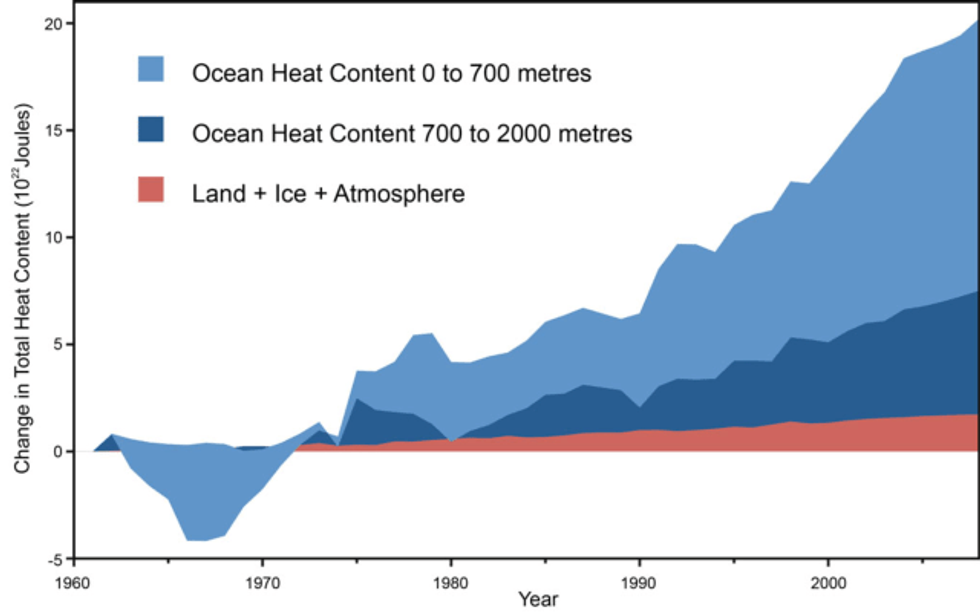New Research Shows Global Warming Speeding Up
Scientists find 'missing heat' in deep ocean waters

A new study published in the journal Geophysical Research Letters says that in the past 15 years we've undergone "the most sustained warming trend."
The researchers attribute this "missing heat" phenomena to the fact that about 90% of overall global warming goes into heating the oceans, and the oceans have been cooking.
The myth that global warming has slowed--which is frequently cited by climate deniers and perpetuated by "fundamentally flawed" studies that do not account for the warming of deep ocean waters--has had the dangerous effect of "lull[ing] many people into a false and unwarranted sense of security," writes Skeptical Science, "with many people wrongly believing global warming has paused when in reality it has accelerated."
The article, "Distinctive climate signals in reanalysis of global ocean heat content," explains how the strength of recent La Nina events has caused a large amount of heat from global warming to be transferred to the deep oceans. According to the study, "In the last decade, about 30% of the warming has occurred below 700 m, contributing significantly to an acceleration of the warming trend."
Meanwhile, the warming at the surface has slowed down in recent years due to subsequent "sharp cooling" events, such as volcanic eruptions and El Nino patterns.
Leading climatologist Dr. Jeff Masters of Weather Underground explains that, despite this apparent slowdown, the "total amount of heat going in the atmosphere/oceans/surface has continued unabated."
As report co-author Kevin Trenberth explained to Skeptical Science, "It means less short term warming at the surface but at the expense of a greater earlier long-term warming, and faster sea level rise," because the extra heat energy causes ocean water to expand.
"The global warming end result will be the same," writes Skeptical Science, "but the pattern of surface warming over time may be different than we expect." They conclude:
Most importantly, everybody (climate scientists and contrarians included) must learn to stop equating surface and shallow ocean warming with global warming. [...] We need to measure global warming by accounting for all changes in global heat content, including the deeper oceans. Otherwise we can easily fool ourselves into underestimating the danger of the climate problem we face.
_____________________
An Urgent Message From Our Co-Founder
Dear Common Dreams reader, The U.S. is on a fast track to authoritarianism like nothing I've ever seen. Meanwhile, corporate news outlets are utterly capitulating to Trump, twisting their coverage to avoid drawing his ire while lining up to stuff cash in his pockets. That's why I believe that Common Dreams is doing the best and most consequential reporting that we've ever done. Our small but mighty team is a progressive reporting powerhouse, covering the news every day that the corporate media never will. Our mission has always been simple: To inform. To inspire. And to ignite change for the common good. Now here's the key piece that I want all our readers to understand: None of this would be possible without your financial support. That's not just some fundraising cliche. It's the absolute and literal truth. We don't accept corporate advertising and never will. We don't have a paywall because we don't think people should be blocked from critical news based on their ability to pay. Everything we do is funded by the donations of readers like you. Will you donate now to help power the nonprofit, independent reporting of Common Dreams? Thank you for being a vital member of our community. Together, we can keep independent journalism alive when it’s needed most. - Craig Brown, Co-founder |

A new study published in the journal Geophysical Research Letters says that in the past 15 years we've undergone "the most sustained warming trend."
The researchers attribute this "missing heat" phenomena to the fact that about 90% of overall global warming goes into heating the oceans, and the oceans have been cooking.
The myth that global warming has slowed--which is frequently cited by climate deniers and perpetuated by "fundamentally flawed" studies that do not account for the warming of deep ocean waters--has had the dangerous effect of "lull[ing] many people into a false and unwarranted sense of security," writes Skeptical Science, "with many people wrongly believing global warming has paused when in reality it has accelerated."
The article, "Distinctive climate signals in reanalysis of global ocean heat content," explains how the strength of recent La Nina events has caused a large amount of heat from global warming to be transferred to the deep oceans. According to the study, "In the last decade, about 30% of the warming has occurred below 700 m, contributing significantly to an acceleration of the warming trend."
Meanwhile, the warming at the surface has slowed down in recent years due to subsequent "sharp cooling" events, such as volcanic eruptions and El Nino patterns.
Leading climatologist Dr. Jeff Masters of Weather Underground explains that, despite this apparent slowdown, the "total amount of heat going in the atmosphere/oceans/surface has continued unabated."
As report co-author Kevin Trenberth explained to Skeptical Science, "It means less short term warming at the surface but at the expense of a greater earlier long-term warming, and faster sea level rise," because the extra heat energy causes ocean water to expand.
"The global warming end result will be the same," writes Skeptical Science, "but the pattern of surface warming over time may be different than we expect." They conclude:
Most importantly, everybody (climate scientists and contrarians included) must learn to stop equating surface and shallow ocean warming with global warming. [...] We need to measure global warming by accounting for all changes in global heat content, including the deeper oceans. Otherwise we can easily fool ourselves into underestimating the danger of the climate problem we face.
_____________________

A new study published in the journal Geophysical Research Letters says that in the past 15 years we've undergone "the most sustained warming trend."
The researchers attribute this "missing heat" phenomena to the fact that about 90% of overall global warming goes into heating the oceans, and the oceans have been cooking.
The myth that global warming has slowed--which is frequently cited by climate deniers and perpetuated by "fundamentally flawed" studies that do not account for the warming of deep ocean waters--has had the dangerous effect of "lull[ing] many people into a false and unwarranted sense of security," writes Skeptical Science, "with many people wrongly believing global warming has paused when in reality it has accelerated."
The article, "Distinctive climate signals in reanalysis of global ocean heat content," explains how the strength of recent La Nina events has caused a large amount of heat from global warming to be transferred to the deep oceans. According to the study, "In the last decade, about 30% of the warming has occurred below 700 m, contributing significantly to an acceleration of the warming trend."
Meanwhile, the warming at the surface has slowed down in recent years due to subsequent "sharp cooling" events, such as volcanic eruptions and El Nino patterns.
Leading climatologist Dr. Jeff Masters of Weather Underground explains that, despite this apparent slowdown, the "total amount of heat going in the atmosphere/oceans/surface has continued unabated."
As report co-author Kevin Trenberth explained to Skeptical Science, "It means less short term warming at the surface but at the expense of a greater earlier long-term warming, and faster sea level rise," because the extra heat energy causes ocean water to expand.
"The global warming end result will be the same," writes Skeptical Science, "but the pattern of surface warming over time may be different than we expect." They conclude:
Most importantly, everybody (climate scientists and contrarians included) must learn to stop equating surface and shallow ocean warming with global warming. [...] We need to measure global warming by accounting for all changes in global heat content, including the deeper oceans. Otherwise we can easily fool ourselves into underestimating the danger of the climate problem we face.
_____________________

